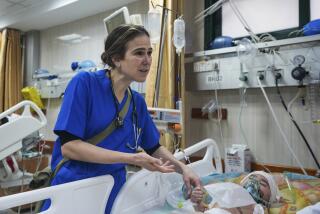‘When I First Got My Legs, I Had to Practice Every Day’
- Share via
Nizar El-Barky, 15, a Palestinian from the Gaza Strip, is a triple amputee who has gotten medical attention at the Los Angeles unit of Shriners Hospital for Crippled Children since 1991, after he lost both legs and one arm as he picked up an explosive device. His trips to the U.S. are sponsored by the Palestine Children’s Relief Fund. The fund brings economically disadvantaged disabled Palestinian and Lebanese children to the U.S. for medical treatment, which is provided free by Shriners and other hospitals. Nizar left Los Angeles this week for visits with his sponsors in Ohio. He, his doctor and his “host mother” were interviewed by KATE SEELYE.
*
YOSHIO SETIGUCHI: Pediatrician, prosthetics specialist, Los Angeles unit of Shriners Hospital for Crippled Children; has treated Nizar on each of three visits since 1991.
The biggest problem for Nizar initially was adapting to this country. Here was a 10-year-old from a refugee camp. Suddenly he was here in sunny Southern California, and he had to acclimate to different food, different kinds of people, a different language. We we were trying to deal with these issues at the same that we were dealing with his amputation and fitting him for his prostheses. It was slow. But you can see for yourself, he’s walking independently, he’s not afraid to go out in public.
Shriners is only a part of his story, regardless of what we’ve done for him, we’ve only been a small part in shaping his life. His parents have contributed a great deal to his personality; his school has, too. I feel good because these kids all walk out of the hospital using their prostheses, but really what matters is the children’s attitude and how they perceive what’s happened to them and how they learn to change their lives.
There is no question that Nizar is a fortunate kid, but this always raises the question of why he was selected and what about the others that didn’t get selected. The only answer I can see is for us to train people here from countries that are in need, and when they go back home, then maybe more children can be helped.
*
LEILA BROOKS: Businesswoman and host mother, San Bernardino.
Nizar came here without the language, without legs, without an arm, with psychological problems galore. But he excelled in school and overcame his disabilities. Looking at him makes you more determined as a human being. I’ll never forget what he told me a few years ago when he was 12 or 13. His family is very poor. He said the first money he makes, he’s going to buy his dad a new donkey. He didn’t want to buy a game or a computer. I feel children like him are so important to help, because they’re paying the price for the political situation.
The hardest part of having a child live with you is staying strong through their pain and healing process. We get among the most severe cases here in L.A. because this Shriners unit specializes in burn reconstructive surgery and prosthetics. It’s tough enough to watch a child suffer, but it’s even worse to have to tell them they’ve got to suffer some more to get better.
*
NIZAR EL-BARKY
I have been coming to the States since I was 10. It’s fun going to places like Disneyland. I can’t have this kind of fun in Gaza. It’s like summer vacation all the time. I come to Shriners every two years to get new legs. I look forward to it, because at the end of two years, my legs are broken or one will be shorter than the other, making it hard for me to walk. When I first got my legs, I had to practice walking every day in the hospital for many months. I was living near the Shriners and going to school during the morning and then to the hospital for training all afternoon. Now, though, I can just put on my new legs and leave. I got a new arm this time. too. I didn’t wear one before because I could do a lot without it, like ride a bike. There’s a woman at the hospital with no legs and no arms, and she drives a van. I look at her and think if she can drive, I can do anything.
[El Barky was injured when he was 9. He said he reached for something that dropped from an Israeli helicopter that he thought was a toy. It exploded.] It was pretty bad. Sometimes I say, why me, why Nizar, but it could happen to anyone. At least I have my mind, I have my brain. When I was in school in Ohio, I won the “Yes I Can!” award [from the National Council of Handicapped Children] because I learned to read and write quickly. I didn’t read or write before I came.
I got a letter from Bill Clinton. It made me feel good. I know there’s a lot of other kids that didn’t have this chance. Many wonderful people have helped me to come here. If they hadn’t, I’d still be in a wheelchair in Palestine.
More to Read
Sign up for Essential California
The most important California stories and recommendations in your inbox every morning.
You may occasionally receive promotional content from the Los Angeles Times.













